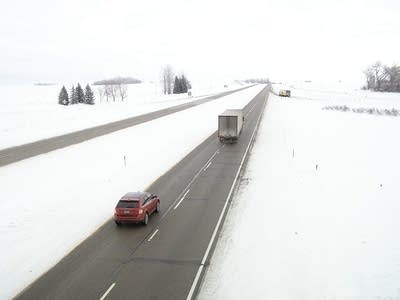Transportation funding debate becomes more urgent

One national commission studying the crumbling road and bridge system in this country says we need a 40-cent per gallon federal gas increase.
Then about two weeks ago, another national commission chimed in and recommended a 10-cent per gallon increase. The chances of either one happening are murky at this point.
John Schadl, a spokesman for U.S. Rep. Jim Oberstar, DFL-Minn., the chair of the House Transportation Committee, is non-committal.

"There are not any solid proposals at this point. We're not going to be talking about anything concrete until later on in the year," Schadl said.
Create a More Connected Minnesota
MPR News is your trusted resource for the news you need. With your support, MPR News brings accessible, courageous journalism and authentic conversation to everyone - free of paywalls and barriers. Your gift makes a difference.
Oberstar, Schadl's boss, tells the New York Times a temporary gas tax increase is possible, perhaps combined with a vehicle miles traveled, or VMT fee.
The reason for all the speculation is the House Transportation Committee is starting work on the next six-year federal transportation bill. And it will be a big one.
"They're talking about a half a trillion dollar program," said Rob Puentes, a transportation analyst at the Brookings Institution.
By comparison, the transportation bill that expires this year is about $286 billion.

There's another deadline on the horizon. The government's big road and bridge checking account, the Federal Highway Trust Fund, is just about out of money -- again.
Congress replenished the depleted fund last year, and it's expected to run out of money by late summer again this year, Puentes says.
"They're talking about another $9.5 billion, $10 billion shortfall between now and the end of the summer. Where that money is going to come from is anybody's guess at this point," Puentes said.
The gas tax is the principal revenue-raiser for the trust fund. The federal gasoline tax is just over 18 cents a gallon. About 15 cents goes for roads and bridges, and the rest -- about 3 cents -- goes for mass transit. The tax rate hasn't been increased for 16 years.
In the meantime, a group of road and bridge builders estimates the nation is $225 billion short every year on deferred maintenance and other road and bridge costs.
The federal gasoline tax is just over 18 cents a gallon. The tax rate hasn't been increased for 16 years.
The federal transportation stimulus money, nearly $400 million for Minnesota alone, helps. But it's probably one-time money, and relatively speaking it's a drop in the bucket when measured against what things really cost.
For example, the cost of the Twin Cities Crosstown rebuild is about $280 million. The Central Corridor light rail line pricetag is approaching $1 billion.
That brings the focus back to the gas tax. Its reliability as a stable, long-term source of funding is waning a bit as people cut back on driving, and more efficient vehicles hit the road.
But some experts still like it because it is reasonably fair -- it's a user fee assessed against people who use roads and bridges.
The federal government estimates that drivers in this country burn 390 million gallons of gas a day. An extra dime would add $14.2 billion a year to the fund. (One commission recommends raising the tax on diesel fuel by 15 cents a gallon, an amount not included in this estimate).
That's a skimpy down payment when measured against hundreds of billions in deferred road and bridge maintenance, and the cost of some new buses and trains.

Then there's the political reality.
Quite a few drivers appear resistant to paying higher fuel taxes. The result, according to Robert Johns, is a dilemma.
Johns, who directs the University of Minnesota's Center for Transportation Studies, says we are at a turning point in transportation policy in this country. He says a wideranging discussion is underway about where to find the money for transportation.
"Do you raise the gas tax, even in spite of that political public reaction? Do you start exploring vehicle miles traveled fees? There are other mechanisms," Johns said. "We're doing a study for the Legislature for value capture. How do you capture the value of property that increases due to transportation investment, to help pay for the transportation facility?"
Among Minnesota lawmakers, there's little or no appetite for proposing another increase in the state gas tax after they raised it just last year.
David Goldberg, a transportation advocate, agrees that during this rotten economy, it's not a good time for talk of higher taxes to finance transportation.
Goldberg, who works for Transportation for America, a new Washington, D.C.-based transportation and transit advocacy group, says experience around the country shows if voters see how the money is being used and how it will affect them, they may support paying more.
"People have been willing, in recent years, to vote themselves a tax increase for a set of projects or a plan that they understand," Goldberg said.
Goldberg, the Brookings' Rob Puentes and the University of Minnesota's Robert Johns agree the old days of writing a blank check for transportation projects are over.
People want to see specifics about how spending will benefit them.
